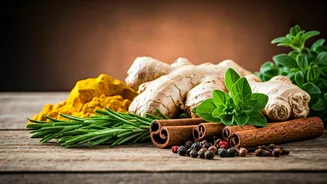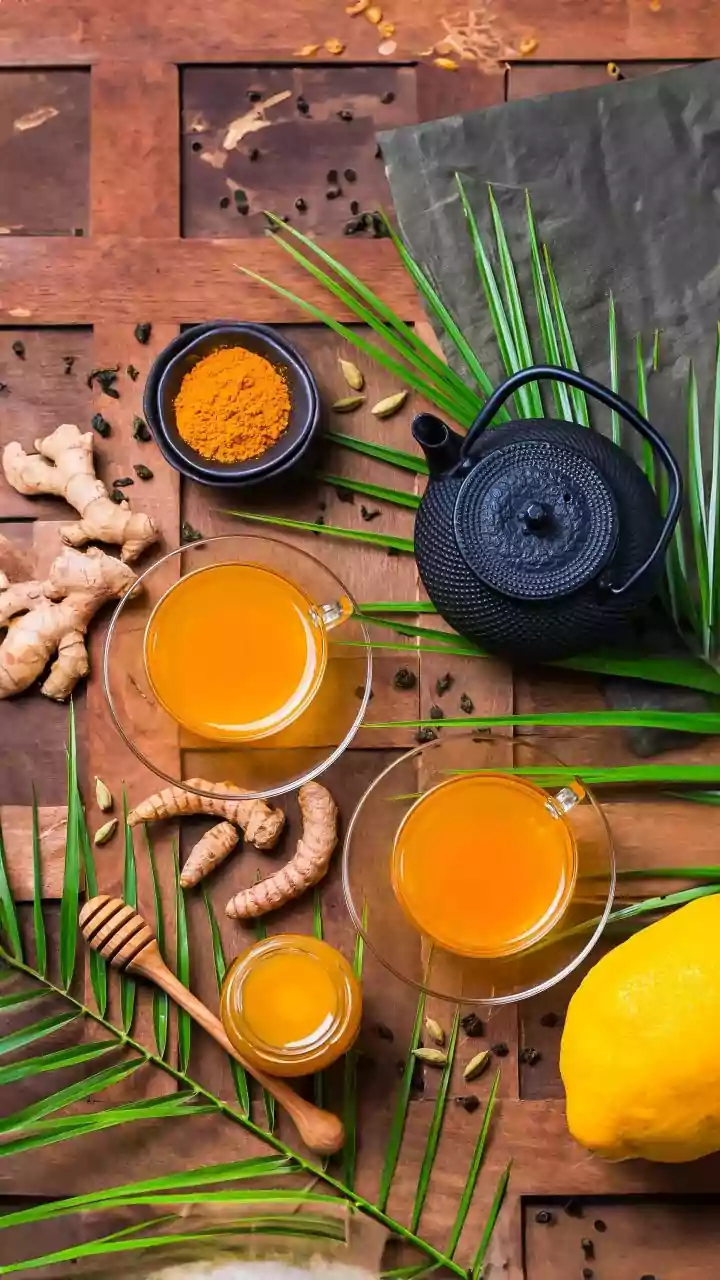Embrace Herbal Goodness
Incorporating herbs and spices into your daily meals is a fantastic starting point for nurturing your gut health. Herbs like ginger, turmeric, and cinnamon
are not only flavorful but also possess potent anti-inflammatory properties, offering significant benefits to your digestive system. These culinary additions can reduce inflammation and promote a balanced gut environment. Consider adding these ingredients liberally to your cooking this holiday season. Turmeric, for instance, is known for its curcumin content, which acts as a powerful antioxidant, shielding your gut from oxidative stress. Ginger can aid in easing nausea and improving digestion. Similarly, cinnamon can assist in regulating blood sugar levels, indirectly aiding gut health. By consciously including these herbs and spices in your holiday recipes, you're taking a delicious step towards a healthier gut.
Prioritize Fiber Intake
Fiber is a cornerstone of a healthy digestive system, acting as food for the beneficial bacteria residing in your gut. During the holiday season, rich and heavy meals often dominate the table, potentially leading to digestive issues. Increase your fiber intake to counteract this. Include fiber-rich foods like fruits, vegetables, and whole grains in your diet. Think about incorporating apples, pears, berries, and broccoli into your meals, as these offer both fiber and an array of essential nutrients. Whole grains, such as oats and quinoa, are also excellent choices, providing sustained energy and fiber. Aim for a variety of fiber sources to maximize the benefits, supporting the growth of diverse gut bacteria. This diversity enhances the overall resilience of your digestive system, helping it better handle the holiday indulgences.
Stay Hydrated Daily
Maintaining sufficient hydration is crucial for optimal gut health. Water is essential for the smooth functioning of your digestive system, assisting in the efficient breakdown and absorption of nutrients. It also helps to prevent constipation, a common ailment during the holidays due to changes in diet and routine. Try to drink at least eight glasses of water daily. You may choose to infuse water with slices of lemon, cucumber, or mint to make it more appealing. Consider drinking herbal teas, which offer additional health benefits and can contribute to your daily hydration goals. Adequate hydration helps maintain the health and function of your gut lining, reinforcing the barrier against harmful substances. It also plays a key role in the balance of gut flora, thereby fostering better digestive health.
Limit Processed Foods
Processed foods are often packed with artificial additives, excessive sugar, and unhealthy fats, which can disrupt your gut health. During the holidays, these items are often present in abundance. High sugar intake fuels the growth of harmful bacteria in your gut. Unhealthy fats can increase inflammation, while artificial additives can irritate your digestive tract. Minimize your intake of processed foods like sugary snacks, refined grains, and fast food. Opt instead for fresh, whole foods that support a healthy gut. Focus on preparing home-cooked meals using fresh ingredients, which allows you to control the quality of the food you consume. Choose snacks like fresh fruits, vegetables with hummus, or a handful of nuts. Doing this will reduce the burden on your digestive system, enabling it to function at its best.
Manage Stress Levels
Stress and gut health are closely linked, with high-stress levels potentially causing digestive problems. The holiday season is often marked by increased stress due to family gatherings, financial pressures, and busy schedules. Find ways to manage stress to protect your gut health. Practice relaxation techniques like deep breathing exercises or meditation. Regular physical activity, such as walking or yoga, can also help to lower stress levels. Make time for activities you enjoy, whether it’s reading a book, listening to music, or spending time in nature. Getting enough sleep is also essential for stress management; aim for seven to eight hours of quality sleep each night. By proactively managing your stress, you can reduce the negative effects on your gut health, promoting a more balanced and harmonious digestive system.
Eat Mindfully and Slowly
Mindful eating can greatly improve your digestion and gut health. Eating slowly, savoring each bite, and paying attention to your body's signals of hunger and fullness can prevent overeating and reduce digestive discomfort. During the holiday season, there is often a rush to eat and enjoy all the treats. Practice mindful eating by putting down your fork between bites, chewing your food thoroughly, and focusing on the flavors and textures. Avoid distractions like television or your phone while eating to fully concentrate on your meal. Pay attention to how your body feels after eating and stop when you feel satisfied, not stuffed. Mindful eating helps you make more conscious food choices and can assist in the proper breakdown and absorption of nutrients, fostering better gut health.
Consider Probiotics and Prebiotics
Probiotics and prebiotics can be beneficial additions to your gut health regimen. Probiotics are live microorganisms that promote a healthy gut environment, while prebiotics are non-digestible fibers that feed beneficial gut bacteria. Probiotics are available in supplement form, as well as in fermented foods like yogurt, kefir, sauerkraut, and kimchi. These foods help to increase the diversity of beneficial bacteria in your gut. Prebiotics are found in various foods, including onions, garlic, bananas, and oats. Incorporating these foods into your diet can help nourish your gut bacteria, encouraging them to thrive. Consult a healthcare professional before starting any supplements to ensure they are appropriate for your individual needs. When used strategically, these supplements and dietary adjustments can greatly boost gut health, particularly during the holiday season.




















